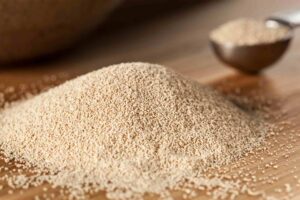In dogs, a diet supplemented with Saccharomyces cerevisiae yeast fermentation products (SCFP) has a positive impact on dermal health, circulating immune cell numbers, and oxidative stress.
Functional ingredients in pet diets fall into the category of wellness-related products, as they provide health benefits to the body beyond the mere supply of essential nutrients (water, vitamins, minerals, etc.).
Various studies have analyzed the health benefits of functional ingredients in humans, which has led to the belief that the same effects could be translated to pets. However, in dogs, the mechanisms of action, proper proportions and possible harmful effects of most functional ingredients have not yet been fully elucidated.
The products of yeast fermentation Saccharomyces cerevisiae (SCFP), include: residual yeast cells, cell wall fragments and metabolites resulting from the fermentation process.
It has been shown that this kind of functional ingredient can have a positive impact on the immune system and overall health of both humans and other animal species, including pigs and cattle.
The unsuspected value of Saccharomyces cerevisiae
Although there is evidence in the scientific literature about the effectiveness of SCFPs, further investigations are still needed to assess their possible ability to influence oxidative stress and immune responses. A U.S. study recently appeared in the Journal of Animal Science investigated the effects of a diet supplemented with SCFP on circulating immune cell percentages, antioxidant status and oxidative stress, and dermal and coat health of adult dogs.
The analysis involved 16 adult dogs that were enrolled in a randomized cross-over study. All dogs were fed a control diet for 4 weeks and then randomly assigned to the control or SCFP-supplemented diet for 10 weeks. After a washout period, the authors began the second 10-week experimental period in which the dogs received opposite diets from the first experimental period. The dermis and coat of dogs were evaluated at baseline and after the two treatment phasesand blood samples at pre- and postprandial periods were collected.
Hydration status, trans epidermal water loss (TEWL) and sebum concentrations, as well as oxidative stress and immune cell function were, in addition, measured.
The results showed that compared with baseline, changes in sebum concentration tended to be higher in the group of dogs fed SCFP diets than in the control group. In addition, the change in TEWL from baseline was lower at the back level in dogs in the control group and at the ear level in dogs fed SCFP. In the latter, the values reduced by TEWL at the level of the ears could indicate improved dermal integrity, and increased sebum concentration can also be interpreted as a positive finding, since sebum protects the epidermis by lubricating the stratum corneum and hair follicle.
In addition to these data, results showed that the SCFP diet had effects on some parameters of cellulomediated and humoral immunity, enhancing delayed hypersensitivity responses to nonspecific lymphocyte mitogens and modulating circulating lymphocyte populations.
Although it is difficult to interpret the observed changes in immune cell populations between dogs supplemented with SCFP and control dogs, the decrease in circulating lymphocytes among SCFP-fed dogs may suggest a more balanced immune response.
In addition, supplementation with SCFP increased serum concentrations of the enzyme superoxide dismutase (SOD) and reduced mRNA expression of the enzyme catalase, suggesting a positive action . This suggests that antioxidant defenses might be more efficient in dogs fed SCFP diet.
Future Perspectives
The study by Wilson et al. opens up new application prospects for SCFP and its use as an effective functional ingredient for combating oxidative stress and maintaining dermal integrity.
Moreover, such supplementation is certainly more beneficial in dogs that are elderly and/or have special skin sensitivities.
It also lays the groundwork for future studies to better interpret the observed changes in immune cell numbers.
Reference
Wilson SM, Oba PM, Koziol SA, Applegate CC, Soto-Diaz K, Steelman AJ, Panasevich MR, Norton SA, Swanson KS. Effects of a Saccharomyces cerevisiae fermentation product-supplemented diet on circulating immune cells and oxidative stress markers of dogs. J Anim Sci. 2022 Sep 1;100(9):skac245. doi: 10.1093/jas/skac245.







